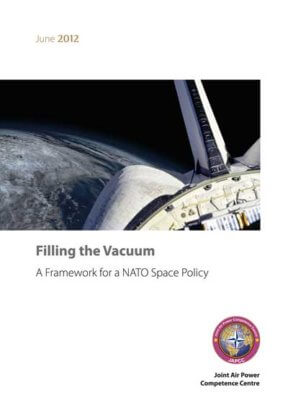Introduction
“Command and control of military forces, precise air power, missile guidance, troop movements, environmental reconnaissance, and missile warning all have come to depend, to a large degree, on information relayed by satellites.”
Aim and Scope
The JAPCC originally developed and refined this proposal as a portion of its contribution to the Allied Command Transformation (ACT) Space Integrated Project Team, known colloquially as the Space IPT. While the Space IPT subsequently decided to suspend its efforts on the policy front the JAPCC considers this particular effort still worthy of continued investigation. As a Centre of Excellence, the JAPCC offers advice that decision makers can accept, or not, as they see fit. The JAPCC intends with this document not to write a broad NATO policy, but to help readers understand the operational impact of realistic and achievable specifically targeted policy prescriptions. The following proposal is intentionally narrow in scope and concentrated on the employment, coordination and defence of space capabilities used to support NATO operations and core business. By scoping the problem down to the essential elements, the aim is to identify the critical concepts supporting military activities. Table 1 on the following page shows a partial list of various NATO uses of space and associated systems.
Why Policy?
Why write a policy for anything? Before the answer to why, the first question is actually ‘what?’ For the sake of simplicity, this document will use the definitions of policy from Merriam-Webster:
V1: “A definite course or method of action selected from among alternatives and in light of given conditions to guide and determine present and future decisions.”
V2: “A high-level overall plan embracing the general goals and acceptable procedures especially of a governmental body.”
Given the above, the answer to ‘why’ policy is written is to:
- Guide decisions;
- Choose a course of action;
- Adopt and communicate goals and procedures.
At the operational level these key factors enable deliberate planning, inform the provision and prioritisation of resources, provide a basis for improvement, provide personnel with documented guidance to aid their work, and reduce the pendulum swings which changing personalities can induce in organisations. Ultimately, policy enables appropriate and advanced preparation.
From a political perspective, the value of policy is to enable oversight and coherence. When decisions are made in the absence of policy, they may not aggregate into the outcome desired; especially if the desired outcome has not been previously determined and publicised.
Does NATO Need a ‘Space’ Policy?
Some raise legitimate questions about the need for a NATO Space Policy. As is often pointed out, NATO does not own satellites. NATO lacks policies for Air, Land and Sea (excepting the recent Alliance Maritime Strategy) yet continues to demonstrate competence in these domains. No adversary has challenged NATO’s use of space for operations. Why invest political effort to codify how the Alliance relates to space?
- Ultimately the question is subjective and no matter what pros, cons or evidence is offered, reasonable people presented with the same information may well reach different conclusions. The question could just as easily be stated in the negative; namely “Why doesn’t NATO need a space policy?” Consequently, we invite readers to recall the point of policy as a mechanism to guide decisions, chose a course of action and adopt and communicate goals while answering for themselves the questions below:
- Is space a unique operational domain requiring unique understanding and guidance?
- Would applying the concept of collective defence to space capabilities complicate an adversary’s decision to interfere with their use and thereby aid NATO’s deterrence posture?
- Would coordination among NATO space capability providers increase effectiveness on behalf of NATO?
- Are today’s NATO forces adequately prepared to conduct operations without the assistance of space based enabling technologies such as satellite communications, global satellite navigation, ballistic missile early warning, satellite intelligence and meteorological support?
- Can NATO make consolidated, consistent and coordinated measures to improve the use and defence of space capabilities?
- Is sharing space-derived information useful to operations and planning across the Alliance?
- Does today’s use of space capabilities for NATO purposes equate to space weaponisation?
- Can NATO realistically achieve the ambitions of the 2010 Strategic Concept without proactively addressing the space domain?











